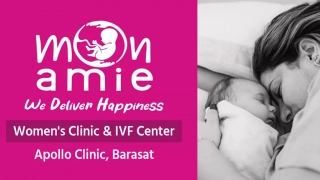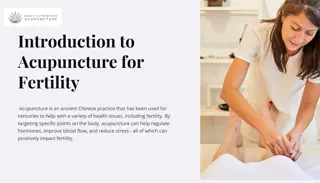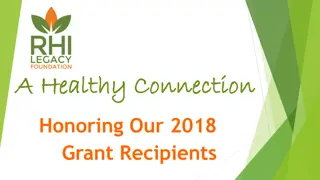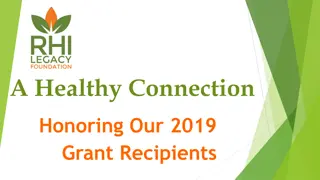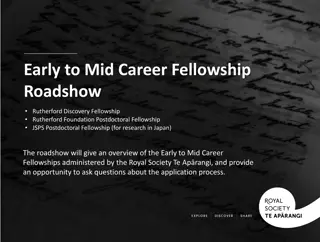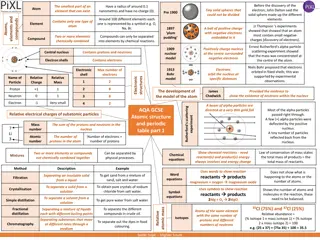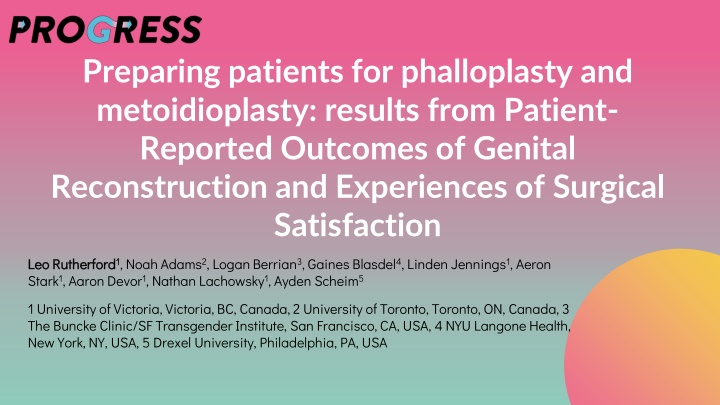
Experiences and Outcomes of Phalloplasty and Metoidioplasty Preparation Study
Explore patient-reported readiness for surgery and preparation experiences in phalloplasty and metoidioplasty through a community-based research project. Understand the effectiveness of mental health assessments and informed consent processes in helping patients make informed decisions.
Download Presentation

Please find below an Image/Link to download the presentation.
The content on the website is provided AS IS for your information and personal use only. It may not be sold, licensed, or shared on other websites without obtaining consent from the author. If you encounter any issues during the download, it is possible that the publisher has removed the file from their server.
You are allowed to download the files provided on this website for personal or commercial use, subject to the condition that they are used lawfully. All files are the property of their respective owners.
The content on the website is provided AS IS for your information and personal use only. It may not be sold, licensed, or shared on other websites without obtaining consent from the author.
E N D
Presentation Transcript
Preparing patients for phalloplasty and metoidioplasty: results from Patient- Reported Outcomes of Genital Reconstruction and Experiences of Surgical Satisfaction Leo Rutherford Leo Rutherford1 1, Noah Adams2, Logan Berrian3, Gaines Blasdel4, Linden Jennings1, Aeron Stark1, Aaron Devor1, Nathan Lachowsky1, Ayden Scheim5 1 University of Victoria, Victoria, BC, Canada, 2 University of Toronto, Toronto, ON, Canada, 3 The Buncke Clinic/SF Transgender Institute, San Francisco, CA, USA, 4 NYU Langone Health, New York, NY, USA, 5 Drexel University, Philadelphia, PA, USA
About the project Community based, patient-oriented study about experiences with and outcomes of phalloplasty and metoidioplasty More info can be found about our team on our Designed by myself and 6 other trans community members with lived experience of these surgeries website, progresscolab.net. You can also follow us on social media @progresscolab.
Background The SOC advise that a readiness assessment be conducted by two independent mental health professionals who have a responsibility to encourage, guide, and assist clients with making fully informed decisions and becoming adequately prepared (WPATH SOC v. 7 page 27). Qualitative data suggests that mental health assessments are limited in their capacity to prepare patients (Mackinnon et al., 2020) Others have critiqued informed consent processes such as readiness assessments for not providing necessary information to patients (Ashley, 2020)
Methods Recruitment Eligibility Over 3 months using: Social media Email networks and listservs Trans or non-binary Phalloplasty and/or metoidioplasty Living in the U.S. or Canada Measures Analysis Kenton s preoperative preparedness questionnaire (adapted version) Questions developed by our team Using SPSS Descriptive statistics and crosstabs
Research questions include: What was the most common way readiness for surgery was assessed among our sample and how useful were these to prepare for surgery? Where did our sample access information or resources to prepare for surgery and what was most useful to them? Overall, did our participants feel prepared to undergo surgery?
Results: Item 11 of Kentons Preoperative Preparedness Questionnaire Overall, I felt prepared for surgery 50 45 40 35 30 25 20 15 10 5 0 203 responses Strongly Agree Agree Somewhat Agree Somewhat Disagree Disagree Strongly Disagree Percent
Results: created survey items What did the process of obtaining approval to have surgery look like for you? Select all that apply. Workshop or training A combincation of letter and a class or workshop Interview by a readiness assessor One letter from a therpist Two letters from a therapist 0 10 20 30 40 50 60 70 80 90 Percent
How useful was the method of approval for preparing you to have surgery? 60 50 40 30 20 10 0 Two letters from a therapist One letter Interview by readiness assessor Combination, workshops and letter Extremely Useful Very Useful Moderately Useful Slightly useful Not useful at all
Item Average rating (highest to lowest) Standard deviation How helpful were each* of the following in preparing you to have surgery? Likert scale of 1-5 Facebook group or Reddit 4.48 .78 Consults with surgeons 4.30 .96 Reading blogs by post- op trans men 4.26 .89 Conversation with peers 4.01 1.07 Online virtual support groups 4.00 1.19 Talking to a counselor or therapist 3.57 .94 *Participants only rated the helpfulness of resources they accessed while preparing for surgery Resources prepared by LGBTQ advocacy group 3.45 1.09 Surgery readiness assessment 2.51 1.19
Discussion Our results show that while generally participants felt prepared to undergo surgery, their readiness assessment process was not useful for preparing them. Instead, our respondents found community spaces and surgical consults to be most useful in preparing for surgery. These results suggest that outside of surgical consults, those preparing for phalloplasty and metoidioplasty put a lot of effort into preparing themselves for surgery. Patients preparing themselves points to a need for patient education and preparedness programs that go beyond the current standard readiness assessment models.
Limitations and future directions These findings are preliminary and results may change based on additional data analysis such as multivariable modeling We did not ask why certain resources were more useful than others for preparing for surgery An advantage of this study was its community-based designed and the lived experience of trans community members while designing items and interpreting data Future research should discern what specifically is most useful for those preparing for surgery and suggest preparedness programs based on results
Thanks! Do you have any questions? leorutherford@uvic.ca theprogressstudy@gmail.com theprogressstudy@gmail.com P Progresscolab.net rogresscolab.net @progresscolab @progresscolab CREDITS: This presentation template was created by Slidesgo, including icons by Flaticon, and infographics & images by Freepik Slidesgo Flaticon Freepik
References Coleman, E., Bockting, W., Botzer, M., Cohen-Kettenis, P., DeCuypere, G., Feldman, J., Fraser, L., Green, J., Knudson, G., Meyer, W. J., Monstrey, S., Adler, R. K., Brown, G. R., Devor, A. H., Ehrbar, R., Ettner, R., Eyler, E., Garofalo, R., Karasic, D. H., . . . Zucker, K. (2012). Standards of care for the health of transsexual, transgender, and gender- nonconforming people, version 7. International Journal of Transgenderism, 13(4), 165 232. https://doi.org/10.1080/15532739.2011.700873 Kinnon R. MacKinnon, Daniel Grace, Stella L. Ng, Suzanne R. Sicchia & Lori E. Ross (2020) I don t think they thought I was ready : How pre-transition assessments create care inequities for trans people with complex mental health in Canada, International Journal of Mental Health, 49:1, 56-80, DOI: 10.1080/00207411.2019.1711328 Ashley, Florence, Surgical Informed Consent and Recognizing a Perioperative Duty to Disclose in Transgender Health Care (June 23, 2020). (2020) 13:2 McGill Journal of Law and Health 73, Available at SSRN: https://ssrn.com/abstract=3633573


